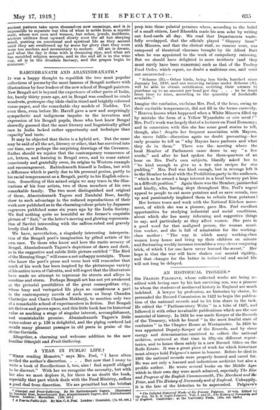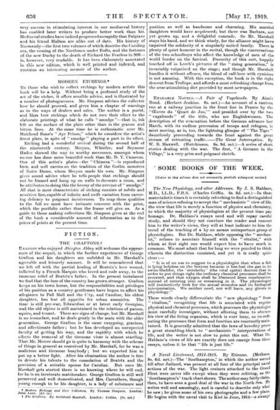AN HISTORICAL PIONEER.*
Sin Flux= Patoaave, whose collected works are being re- edited with loving care by his last surviving son, was a pioneer to whom the students of mediaeval history in England are much indebted. A lawyer by profession, an historian by choice, he persuaded the Record Commission in 1822 to begin the publica- tion of the national records and to let him share in the task. He edited the "Parliamentary Writs" in a folio of 1827, and followed it with other invaluable publications which are the raw material of history. In 1834 he was made Keeper of theRecords of the Treasury, which he found "in the most fearful state of confusion " in the Chapter House at Westminster. In 1838 he was appointed Deputy-Keeper of the Records, and by sheer energy and determination contrived to collect the national archives, scattered at that time in fifty-six different reposi- tories, and to house them safely in a new Record Office on the Rolla Estate. It was a great piece of work for which historians must always hold Palgmve's name in honour. Before he died in 1861 the national records were properly housed and cared for. He was not only a learned and industrious archivist but also a prolific author. He wrote several books on the Middle Ages which in their own day were much admired, especially The Rise and Progress of the Englieh. Commonwealth, The Merchant and the Friar, and The History of Normandy and of England. Unhappily, it is the fate of the historian to be superseded. Palgrave's • The Collectsti Historical Works of Sir Fran.* Palermo 0 his Bon, Sir R. II. Inglis COMM Vols. I. and LI , Ti. I !Wm. 1 'f°1LorounsivEdiledotty of England. Cambridgo; at the University Preas, laOs„ net&sachi IV very success in stimulating interest in our mediaeval history has enabled later writers to produce better work than his. Mediaeval studies have indeed progressed so rapidly that Palgrave and his friend Hallam are alike out of date. His history of Normandy—the first two volumes of which describe the Caroling era, the coming of the Northmen under Rollo, and the fortunes of the new Duchy to the death of Richard the Fearless in 996— is, however, very readable. It has been elaborately annotated in this new edition, which is well printed and indexed, and contains an interesting memoir of the author.



































 Previous page
Previous page